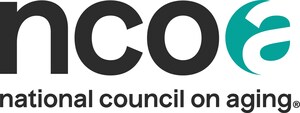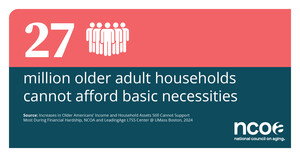Extended Struggle to Find Work Threatens Millions of Older Americans' Economic Security, Ability to Retire
WASHINGTON, Feb. 3, 2011 /PRNewswire-USNewswire/ -- Once they have lost a job, older Americans are more likely than any other age group to remain out of work for 99 weeks or more, as calculated in a new report by the Congressional Research Service.
(Logo: http://photos.prnewswire.com/prnh/20100615/NCOALOGO)
Among unemployed adults over age 65, one out of eight (12.15%) had faced 99 weeks or more of unemployment, sometimes called very long-term unemployment. For unemployed adults ages 55 and over, 11.51% had spent almost the last two years looking for work, considerably higher than the figure of 6% among unemployed workers under age 35.
The report also observes that unemployed black workers were more likely to be out of work for 99 weeks or longer than unemployed white workers. The 99-week mark is significant because it is the current maximum duration of unemployment benefits, although in many states that number is lower.
Older adult unemployment is at a near-record high, double what it was when the recession began in December 2007. Among adults over 65, 6.9% were jobless in December 2010.
"It is urgent that we address the employment needs of millions of frustrated and often desperate older adults and Boomers," said Sandra Y. Nathan, Ph.D., Senior Vice President of Economic Security at the National Council on Aging (NCOA), the leading nonprofit service and advocacy organization for older Americans. "Many have seen their savings and housing values badly eroded in the economic downturn and are living in or dangerously near poverty. For them, a job is a lifeline that can help them make ends meet and get them on a pathway to economic security."
NCOA Helps Mature Workers Build Economic Security
NCOA's workforce development programs offer hope and concrete assistance to mature workers who are seeking to return to, or remain in, the workforce. Partnering with the federal government, NCOA helps older adults find meaningful training and employment opportunities by sponsoring:
- The Senior Community Service Employment Program (SCSEP), which trains low-income workers aged 55+ and places them in community service jobs. NCOA currently operates 27 SCSEP programs in 11 states, with funding from the U.S. Department of Labor.
- The Senior Environmental Employment (SEE) program, which provides an opportunity for retired and unemployed older Americans 55+ to share their expertise in jobs for the Environmental Protection Agency, ranging from clerical and technical to professional assignments as writers, engineers, scientists, and accountants.
Economic Casework Pulls It All Together
Since many low-income older adults face multiple challenges, not just unemployment, NCOA has launched a pilot program to provide economic casework, a one-on-one, holistic approach to solving problems of economic security through financial counseling, education, and benefits coordination, or "financial planning for the rest of us."
"Many low-income seniors and Boomers were very hard hit by the economic downturn, and have little or no time to bounce back," said Ramsey Alwin, Director of NCOA's Economic Security Initiative. "As low-income elders juggle their financial obligations, they become increasingly vulnerable, but with a person-centered approach that draws on everything from utility assistance, legal aid, and debt counseling to job training, they can become much more economically secure."
At twelve locations nationwide, NCOA's Economic Security Service Centers have helped more than 700 older adults find out what benefits they are eligible for and navigate an often confusing and fractured network of public and private programs. NCOA's Economic Security Service Centers are made possible with support from the Harry and Jeanette Weinberg Foundation and the Bank of America Charitable Foundation.
Other NCOA Economic Security Initiatives
NCOA offers other programs to help seniors build their economic security as well, including:
- BenefitsCheckUp.org, a free online screening tool that searches over 2,000 federal, state, local, and private programs to help seniors pay for prescription drugs, utility bills, meals, health care, and other needs.
- Home Equity and Reverse Mortgage Counseling helps millions of seniors make prudent use of the equity in their homes and "use their home to stay at home."
About NCOA
The National Council on Aging is a non-profit service and advocacy organization headquartered in Washington, DC. NCOA is a national voice for older Americans - especially those who are vulnerable and disadvantaged - and the community organizations that serve them. It brings together non-profit organizations, businesses and government to develop creative solutions that improve the lives of all older adults. NCOA works with thousands of organizations across the country to help seniors find jobs and benefits, improve their health, live independently and remain active in their communities. For more information, visit www.NCOA.org.
SOURCE National Council on Aging
WANT YOUR COMPANY'S NEWS FEATURED ON PRNEWSWIRE.COM?
Newsrooms &
Influencers
Digital Media
Outlets
Journalists
Opted In






Share this article